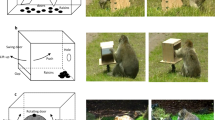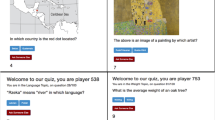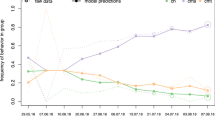Abstract
Social learning is a fundamental element of human cognition. Learning from others facilitates the transmission of information that helps individuals and groups rapidly adjust to new environments and underlies adaptive cultural evolution1–6. While basic human propensities for social learning are traditionally assumed to be species-universal1,7, recent empirical studies show that they vary between individuals and populations8–13. Yet the causes of this variation remain poorly understood9. Here we show that interdependence in everyday social and economic activities can strongly amplify social learning. Using an experimental decision-making task, we examine individual versus social learning in three recently diverged populations of a single-ethnicity group, whose subsistence styles require varying degrees of interdependence. Interdependent pastoralists and urban dwellers have markedly higher propensities for social learning than independent horticulturalists, who predominantly rely on individual payoff information. These results indicate that everyday social and economic practices can mould human social learning strategies and they highlight the flexibility of human cognition to change with local ecology. Our study further suggests that shifts in subsistence styles—which can occur when humans inhabit new habitats or cultural niches2—can alter reliance on social learning and may therefore impact the ability of human societies to adapt to novel circumstances.
This is a preview of subscription content, access via your institution
Access options
Access Nature and 54 other Nature Portfolio journals
Get Nature+, our best-value online-access subscription
$29.99 / 30 days
cancel any time
Subscribe to this journal
Receive 12 digital issues and online access to articles
$119.00 per year
only $9.92 per issue
Buy this article
- Purchase on Springer Link
- Instant access to full article PDF
Prices may be subject to local taxes which are calculated during checkout



Similar content being viewed by others
References
Boyd, R., Richerson, P. J. & Henrich, J. The cultural niche: why social learning is essential for human adaptation. Proc. Natl Acad. Sci. USA 108, 10918–10925 (2011).
Henrich, J. The Secret of Our Success: How Culture is Driving Human Evolution, Domesticating Our Species, and Making Us Smarter (Princeton Univ. Press, 2016).
Hoppitt, W. & Laland, K. N. Social Learning: An Introduction to Mechanisms, Methods, and Models (Princeton Univ. Press, 2013).
Mesoudi, A. Cultural Evolution: How Darwinian Theory Can Explain Human Culture and Synthesize the Social Sciences (Univ. Chicago Press, 2011).
Dean, L. G., Kendal, R. L., Schapiro, S. J., Thierry, B. & Laland, K. N. Identification of the social and cognitive processes underlying human cumulative culture. Science 335, 1114–1118 (2012).
Tomasello, M. The Cultural Origins of Human Cognition (Harvard Univ. Press, 1999).
Enquist, M., Eriksson, K. & Ghirlanda, S. Critical social learning: a solution to Rogers’s paradox of nonadaptive culture. Am. Anthropol. 109, 727–734 (2007).
Efferson, C. et al. Learning, productivity, and noise: an experimental study of cultural transmission on the Bolivian Altiplano. Evol. Hum. Behav. 28, 11–17 (2007).
Mesoudi, A., Chang, L., Dall, S. R. X. & Thornton, A. The evolution of individual and cultural variation in social learning. Trends Ecol. Evol. 31, 215–225 (2016).
Mesoudi, A., Chang, L., Murray, K. & Lu, H. J. Higher frequency of social learning in China than in the West shows cultural variation in the dynamics of cultural evolution. Proc. R. Soc. B 282, 20142209 (2015).
Molleman, L., van den Berg, P. & Weissing, F. J. Consistent individual differences in human social learning strategies. Nat. Commun. 5, 3570 (2014).
Toelch, U., Bruce, M. J., Newson, L., Richerson, P. J. & Reader, S. M. Individual consistency and flexibility in human social information use. Proc. R. Soc. B 281, 20132864 (2014).
van den Berg, P., Molleman, L. & Weissing, F. J. Focus on the success of others leads to selfish behavior. Proc. Natl Acad. Sci. USA 112, 2912–2917 (2015).
Boyd, R. & Richerson, P. J. Why does culture increase human adaptability? Behav. Ecol. Sociobiol. 16, 125–143 (1995).
Mesoudi, A. & Whiten, A. The multiple roles of cultural transmission experiments in understanding human cultural evolution. Phil. Trans. R. Soc. B 363, 3489–3501 (2008).
Rand, D. G. et al. Social heuristics shape intuitive cooperation. Nat. Commun. 5, 3677 (2014).
Talhelm, T. et al. Large-scale psychological differences within China explained by rice versus wheat agriculture. Science 344, 603–608 (2014).
Uskul, A. K., Kitayama, S. & Nisbett, R. E. Ecocultural basis of cognition: farmers and fishermen are more holistic than herders. Proc. Natl Acad. Sci. USA 105, 8552–8556 (2008).
Henrich, J. et al. In search of Homo economicus: behavioral experiments in 15 small-scale societies. Am. Econ. Rev. 91, 73–78 (2001).
Henrich, J. et al. Costly punishment across human societies. Science 312, 1767–1770 (2006).
Tornay, S. in Peoples and Cultures of the Ethio-Sudan Borderlands (ed. Bender, M. L. ) 137–178 (Michigan State Univ., 1981).
Yntiso, G. in Creating and Crossing Boundaries in Ethiopia: Dynamics of Social Categorization and Differentiation (ed. Epple, S. ) 73–91 (Lit Verlag, 2014).
Glowacki, L. & Wrangham, R. Warfare and reproductive success in a tribal population. Proc. Natl Acad. Sci. USA 112, 348–353 (2015).
Glowacki, L. et al. Formation of raiding parties for intergroup violence is mediated by social network structure. Proc. Natl Acad. Sci. USA 113, 12114–12119 (2016).
Glowacki, L. & von Rueden, C. Leadership solves collective action problems in small-scale societies. Phil. Trans. R. Soc. B 370, 20150010 (2015).
Boyd, R. & Richerson, P. J. Culture and The Evolutionary Process (Univ. Chicago Press, 1985).
Efferson, C., Lalive, R., Richerson, P. J., McElreath, R. & Lubell, M. Conformists and mavericks: the empirics of frequency-dependent cultural transmission. Evol. Hum. Behav. 29, 56–64 (2008).
Heyes, C. Grist and mills: on the cultural origins of cultural learning. Phil. Trans. R. Soc. B 367, 2181–2191 (2012).
Derex, M., Beugin, M.-P., Godelle, B. & Raymond, M. Experimental evidence for the influence of group size on cultural complexity. Nature 503, 389–391 (2013).
Derex, M. & Boyd, R. Partial connectivity increases cultural accumulation within groups. Proc. Natl Acad. Sci. USA 113, 2982–2987 (2016).
Grove, M. Population density, mobility, and cultural transmission. J. Archaeol. Sci. 74, 75–84 (2016).
McElreath, R. et al. Applying evolutionary models to the laboratory study of social learning. Evol. Hum. Behav. 26, 483–508 (2005).
Arechar, A., Gaechter, S. & Molleman, L. Conducting interactive experiments online. SSRNhttp://dx.doi.org/10.2139/ssrn.2884409 (2017).
Acknowledgements
We thank the administration of the South Omo Zone and Nyangatom woreda, especially L. Kakuta for logistical support. We thank P. van den Berg, D. van Dolder, S. Gächter, M. Hoffman, R. McElreath, M. Singh, T. Weber, O. Weisel, K. Zhao and the members of the Max Planck Department for Human Behavior, Ecology and Culture for discussions and comments. Funding was provided by The Eric M. Mindich Research Fund for the Foundations of Human Behavior and the Mind Brain and Behavior Interfaculty Initiative at Harvard University. Support to L.G. through the ANR Labex IAST is gratefully acknowledged. L.M. gratefully acknowledges support by the European Research Council (ERC-Adg 295707) and the Open Research Area grant ASTA ID: 176. The funders had no role in study design, data collection and analysis, decision to publish, or preparation of the manuscript.
Author information
Authors and Affiliations
Contributions
L.G. and L.M. jointly designed the study. L.G. collected the data and L.M. analysed the data. Both authors wrote the manuscript.
Corresponding authors
Ethics declarations
Competing interests
The authors declare no competing interests.
Supplementary information
Supplementary Information
Supplementary Notes 1 and 2, Supplementary Figures 1–4, Supplementary Tables 1–4, Supplementary References. (PDF 532 kb)
Rights and permissions
About this article
Cite this article
Glowacki, L., Molleman, L. Subsistence styles shape human social learning strategies. Nat Hum Behav 1, 0098 (2017). https://doi.org/10.1038/s41562-017-0098
Received:
Accepted:
Published:
DOI: https://doi.org/10.1038/s41562-017-0098
This article is cited by
-
Biocultural heritage of transhumant territories
Agriculture and Human Values (2023)
-
Social Support and Network Formation in a Small-Scale Horticulturalist Population
Scientific Data (2022)
-
How long do floods throughout the millennium remain in the collective memory?
Nature Communications (2019)
-
Human susceptibility to social influence and its neural correlates are related to perceived vulnerability to extrinsic morbidity risks
Scientific Reports (2018)
-
Spoils division rules shape aggression between natural groups
Nature Human Behaviour (2018)



